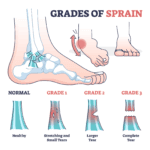The Current State of Child Fitness
In recent years, there has been a concerning decline in fitness levels among children in the UK, accompanied by a rapid increase in the number of overweight children. According to the NHS, approximately one in three children in England aged 10 to 11 is overweight or obese.
Importance of Physical Activity
Building Strong Bones and Muscles
Just like muscles, bones are living tissues that respond to physical activity by becoming stronger. Regular physical activity during childhood is crucial for building bone mass and preventing conditions such as osteoporosis later in life. The NHS recommends that children and young people aged 5 to 18 get at least 60 minutes of moderate-to-vigorous physical activity daily.
Overall Health Benefits
Physical activity goes beyond bone health. It strengthens the heart and lungs, lowers blood pressure, improves muscle strength and flexibility, reduces stress, enhances mental health, helps control weight, and improves sleep quality.
Types of Beneficial Exercises
Weight-Bearing Exercises
Weight-bearing exercises are essential as they force the body to work against gravity, strengthening bones and muscles. Examples include:
- Brisk walking and hiking
- Jogging and running
- Dancing
- Jumping rope
- Tennis, badminton, and pickleball
- Team sports such as basketball, football, and rugby
- Climbing stairs
Strength-Training Exercises
Strength training involves resistance exercises that build muscle mass and enhance bone strength. Common types include:
- Weight machines or free weights
- Bodyweight exercises like push-ups
- Resistance band exercises
Non-Impact Exercises
Although not as effective at building bone density, non-impact exercises such as yoga and tai chi improve flexibility and balance. Non-weight-bearing exercises like swimming and cycling are excellent for cardiovascular health and overall fitness.
Starting a Fitness Programme
Getting Started
Initiating a fitness programme is often the toughest step. Slow and steady progress is essential for improving general fitness. Start with a variety of enjoyable physical activities and include flexibility exercises to prevent injuries.
Activity Guidelines for Children
- Plan for at least 60 minutes of physical activity daily, which can be divided into shorter sessions.
- Maintain a daily activity log to track progress.
- Include a mix of team sports, individual sports, and fun activities such as dancing, swimming, or playing on the playground.
Tips for Parents
Making Exercise Fun
Encourage children to view physical activity as fun rather than a chore. Emphasise enjoyment over competition. Be a role model by participating in physical activities with your children, such as bike rides, ball games, or long walks.
Integrating Physical Activity into Daily Life
- Use physical activity as a reward, such as a family trip to the park or pool.
- Incorporate exercise into daily routines, like walking the dog or raking leaves.
- Schedule physical activities in 10- to 15-minute intervals throughout the day.
- Choose toys and gifts that promote physical activity, such as a jump rope, ball, or roller skates.
Conclusion
Promoting fitness among children in the UK is crucial for their long-term health and well-being. By integrating a variety of enjoyable physical activities into daily routines, children can build strong bones, improve overall health, and establish lifelong healthy habits. Parents play a vital role in encouraging and participating in physical activities with their children, ensuring a healthy and active future.





